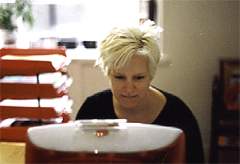 | |||
| cont Tell us about Women in Film and TV It was set up 27 years ago in LA by a group of women who felt that their careers were not progressing as smoothly and as quickly as their male counterparts, contemporaries of theirs. They decided that this was because there was an old boy network controlling work in Hollywood and they thought, "if you can't beat them, join them". They decided to set up a network of the own and so began WFTV. Subsequently, it spread to 18 countries in the world with 42 chapters all of which follow a similar model but have different emphases depending on the country that they're in and, obviously that country's industry. So, in Hollywood its film dominated but in the UK, when WFTV started it was predominantly TV based but obviously the film industry has blossomed in the last five years and that has meant an increase in membership of women in film. We are effectively an events based organisation who's bottom-line is membership. Women pay a subscription fee and for that we have to provide them with various services, the main one being six to eight events per month, most of which are free to members. The events are predominantly London-based but we do have a Wales office which tends to do more lobbying work and also a Birmingham office which always does one event a month and some others in between. There are fun events like pre-release screenings and things like workshops and seminars but there is an emphasis on networking for which we have a strand called Open Forum. That's like a monthly informal discussion around issues which we hope will draw together people with similar backgrounds. In addition to all the events we produce a magazine called In Sync and we organise various flagship events. When WFTV started up its emphasis was really on looking inwards and establishing itself as an organisation that benefited its members but increasingly, for us to survive we need a more public profile within the industry so we began to look outwards by organising these key events. The main flagship event is an awards lunch every December at the Dorchester attended by the great and the good of the industry. I guess it really kicks off the Christmas season, 500 people, eight award winners and a senior Speaker, it gets us a lot of coverage and it's a big fund-raising event as well. In addition to that we always try to do something at The London Film Festival. What we do there is to select a panel of women to deal with a very topical issue e.g. last year we asked, "What makes for a successful British movie?". What that does is it raises Women in Film's profile by placing us in the LFF brochure, and it also gives these women a platform to speak about the work but separate from their gender. We don't set up these panels to discuss what its like to be a woman working in film its more about, again, raising the profile of women in the industry. Is that a frequently asked question? No, surprisingly not, I think that we've established ourselves to such an extent that that is not the first thing people ask us. Yes I remember now what the topic was a couple of years ago, it was about the difference between working with the star system in Hollywood and in the UK. When the industry really kicked off over here recently we were wondering whether we were going to be completely talent led like Hollywood, so we got 2 women that were working in Hollywood and 2 from the UK to debate it. I can't remember now exactly who we got but we definitely had Rachel Tallalay, producer for John Waters and the Nightmare On Elm Street films. After having a nightmare directing Tank Girl in the studio system she ended up coming over here to direct in TV, she's actually directed some of the Randall & Hopkirk series recently. Also, last year we organised a big event called Shooting From The Hip which looked at the contribution of Black and Asian women both in front of and behind the camera. We advertised that widely and not just within the industry but in places like New Nation, Voice and various radio stations, we got a massive response from it with people like Trevor Phillips as guests. We looked at issues like casting, how to move up the career ladder etc. So we are constantly trying to balance the two issues of; looking out for the past interests of our members whilst raising our profile.
How many members you have in the UK? We have 1000 members in the UK, 10,000 worldwide and, in fact, this autumn we are hosting WFTV's international summit. Every year all the chapters meet but previously that had always happened in the States. However, this year is our 10th anniversary so we argued hard for it to take place in the UK, they said yes. I think that's fantastic although I may be dead by the autumn! But, yes it will be good, were expecting about 120 women, Janet Anderson the Minister for film is hosting it at the Houses Of Parliament which is also great because it draws in a lot of the American women who love the tradition! There'll be two aspects of this. One will be to discuss WFTV as an international organisation, you know, how we need to structure how we need to operate international websites etc. Secondly, to set up discussions and panels for the women coming over in terms of their careers. We'll be looking at convergence issues, co-production and getting people like the BBC and Channel 4 involved as well. How much is the membership and how else are you funded? It's £98 a year which includes VAT and is a bargain! That's if you live within the Greater London area, if you live outside it's only £34 because there are less events. About a third of the funding comes from those memberships, a third comes from money raised on the days of the awards and the rest comes from general sponsorship from trade bodies like Pearson Television, Granada etc. We've just started working with a commercial sponsor, Vauxhall but really its our list of members that we see as most valuable. Incidentally, you have to demonstrate that you have worked in the industry to qualify for membership, its not for people who want to work in the industry. That's not us being exclusive, its that we are set up and best placed to facilitate those already working, there are other organisations that help people to get in and we can't be all things at once. Saying that, we do have one monthly event that's open to all for people to find out who we are and how we can help once they've found work. | |||
 |
<<< • page 1 • page 2 • page 3 • >>>
Help • Return to front page • Contact us • About us • Join Email
